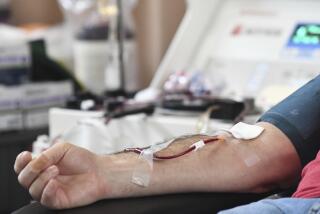Transfusion Supply ‘Quite Safe,’ Health Officials Say : Blood Test for AIDS Declared a Success
- Share via
WASHINGTON — Federal, state and local public health officials, meeting Wednesday to evaluate the effectiveness of the new AIDS blood screening test, overwhelmingly declared it a success in protecting the nation’s blood supply.
“I believe the blood supply is quite safe,” said Dr. James Curran, chief of the AIDS branch of the federal Centers for Disease Control. “I think people shouldn’t avoid elective surgery or be unnecessarily afraid of getting blood transfusions because of AIDS.”
Likewise, other public health officials described the test as highly accurate in detecting blood donors with AIDS antibodies--that is, those who have been exposed to the AIDS virus.
‘Extremely High Rate’
“The test is 99.8% specific, which is an extremely high rate of specificity,” said Dr. Harry M. Meyer, director of the Food and Drug Administration’s Center for Drugs and Biologics. “The big thing this test is trying to do is make the blood supply safer--and we think it has been extremely accurate for that.”
Officials, speaking at a conference sponsored by the CDC, the FDA and the National Institutes of Health, reported that since the test was introduced in April, about one out of every 400 blood donations has proved positive for AIDS antibodies after repeated testing.
They emphasized, however, that positive results do not necessarily mean that the donor has or will get the disease, or that the blood is always infectious. Contaminated blood is discarded by blood collection centers and is not used for transfusions.
AIDS, or acquired immune deficiency syndrome, destroys the body’s immune system, leaving its victims vulnerable to otherwise rare infections. It is believed to be spread through bodily fluids and not through casual contact. The cause of AIDS, which primarily has struck male homosexuals and drug users, has been identified as a virus known as HTLV-3.
No Known Cure
There is no known cure for AIDS, nor has there been an instance where lost immunity has been regained.
Thus far, there have been 12,067 reported cases in the United States, with 6,079 deaths. Of the total, 202 cases have resulted from blood transfusions. California and New York City have the highest incidence of AIDS in the nation.
Dr. Walter Dowdle, director of the CDC’s Center for Infectious Diseases, called the test results “fantastic.”
“My feeling right now is quite a high,” he said. “In April, everything was unknown. We had no idea how to expect the test to perform, but it has shown that there are people out there donating who did not consider themselves at risk and have been picked up. I think that’s a tremendous accomplishment.”
Transfusion-related AIDS cases probably will continue to appear in people who received blood prior to the test, since the disease often has an incubation period of several years or more, Curran said. But he predicted that there will be no new cases resulting from blood screened under the new procedure.
Results of Survey Told
The FDA also reported on the results of a survey of test data in blood collection centers on about 70% of all the blood collected in the United States between April 22 and June 16. Of 1,128,166 units screened, 9,629 were positive for AIDS antibodies on initial testing and 2,831 of the latter figure were positive upon “confirmation” testing.
One interesting statistic--which no one could explain--was that the repeat positive rate was higher for females than for males, 0.23% compared to 0.18%. But, the FDA said, “it is not possible to determine how many of the repeatedly reactive (positive) samples represent . . . infection or false positive.”
The American Red Cross, in a statement, said: “Overall, we believe the . . . test results” identify “perpetually infectious donors” and that the elimination of antibody-positive blood “has made the nation’s blood supply safer with respect to the risk of transfusion-associated AIDS.”
More to Read
Sign up for Essential California
The most important California stories and recommendations in your inbox every morning.
You may occasionally receive promotional content from the Los Angeles Times.













